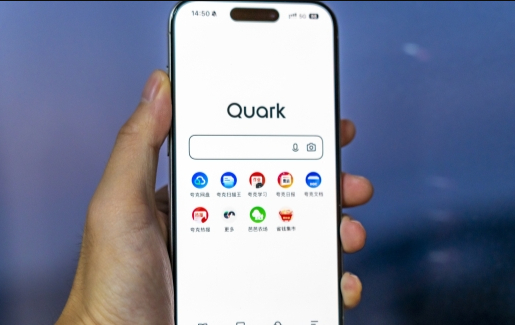Alibaba Group unveiled a new iteration of its artificial intelligence assistant app on Thursday, which will utilize its proprietary Qwen AI reasoning model, in the midst of a rapidly evolving global competition to develop next-generation technology.
This launch marks the company’s most recent initiative to secure a competitive advantage as rivalry grows in the AI application sector, further fueled by the introduction of DeepSeek’s groundbreaking R1 model earlier this year.
Until now, Quark, which debuted in 2016, had been relying on its own AI models known as QuarkLLM. The updated version will merge various functions, including a chatbot, deep reasoning, and task execution, into a single comprehensive app, according to Alibaba’s announcement on Thursday.
Chairman Joe Tsai highlighted in a recent article for the South China Morning Post that effective applications are crucial for maximizing intelligence in the development of AI models.
Last Thursday, the tech giant introduced QwQ-32B, its newest AI reasoning model, which it claimed is comparable to cutting-edge models like DeepSeek-R1.
Last month, Alibaba announced plans to invest 380 billion yuan ($52.5 billion) in cloud computing and AI infrastructure over the next three years. The company asserted that its Qwen AI has performed well in official benchmark assessments, showcasing its increasing influence in this area.
On Tuesday, Manus AI, developed by the Chinese startup Butterfly Effect, announced a strategic partnership with Alibaba. Manus AI is a general AI agent created by the startup Monica, which asserts its capability to outperform OpenAI’s AI agent, DeepResearch.
Experts previously informed CNBC that Alibaba has been making “notable progress” in enhancing its AI cloud business. The company experienced a significant profit increase in the December quarter, driven by its Cloud Intelligence unit and e-commerce sector. Earlier this year, Alibaba established a major partnership with Apple Inc for AI integration on iPhones and is now poised to compete with OpenAI.
The latest version of Quark is powered by Alibaba’s Qwen series reasoning model. It provides advanced functionalities, including a chatbot, deep reasoning, and task execution features through the “all-in-one AI super assistant,” capable of handling tasks from academic research to medical diagnostics, as stated by the Hangzhou-based company on Thursday. Alibaba owns the South China Morning Post.
This marks the first occasion that Alibaba has fully utilized its proprietary foundation models in consumer-oriented businesses. This strategic move coincides with the intensifying race for AI agents in China, where major tech companies are working to build their own user bases.
AI agents are programs that can independently perform tasks on behalf of a user or another system. These agents formulate a plan of specific tasks and subtasks to achieve a goal, utilizing available resources.
Last week, the Chinese AI agent Manus, developed by the start-up Butterfly Effect backed by Tencent Holdings, drew significant attention from the AI community both domestically and internationally during its invitation-only online preview, demonstrating its ability to accomplish various practical tasks, including creating a customized website.
The reimagined Quark is designed to serve as a gateway to “endless possibilities where users can explore everything with AI,” as Alibaba’s model capabilities continue to advance, stated Wu Jia, CEO of Quark and an Alibaba vice-president.
The new version permits users to pose complex questions and seek further information about a topic directly within search engines, as stated by Alibaba.
Quark was originally introduced by Alibaba in 2016, initially serving as a web browser. Over the past nine years, it has amassed over 200 million users in China, according to company data.
This initiative also reflects Alibaba’s wider AI strategy to invest in three core areas in the upcoming years, as outlined last month by group CEO Eddie Wu Yongming.
During a conference call with analysts in February, Wu indicated that the company would enhance its investments in AI and cloud computing, foundation models, and AI-native applications, as well as transforming its existing businesses through technology. The revamp of Quark signifies progress in the third area.
Alibaba has also made organizational changes relevant to the updated product over the past few months.
To better cater to the consumer-facing market, the company has separated the team responsible for developing Qwen-based applications from the one focused on the model series, as reported by Chinese tech media outlet 36Kr in December.
The separated team was transitioned to the Intelligent Information Platform unit of the company, which primarily manages consumer-oriented products, including Quark, according to the report.
Zhang Kuo, president of Alibaba’s international wholesale marketplace, expects the AI initiative to help sellers and buyers on the platform
Alibaba Group Holding’s international wholesale platform, Alibaba.com, anticipates that all sellers will utilize its artificial intelligence (AI) tools by the end of this year, as the e-commerce leader increases its investment in this technology.
Company president Zhang Kuo informed the South China Morning Post in an interview on Monday that more than half of the approximately 200,000 merchants on Alibaba.com were already engaging with its AI applications weekly. Alibaba owns the Post.
Launched in early 2024, these AI tools aim to support sellers in areas like marketing, product management, customer engagement, and risk control, which are part of initiatives to enhance Alibaba’s cross-border e-commerce operations.
Zhang expressed confidence that by year’s end, the adoption rate should reach 100 percent. “Ultimately, when they find these components easier to manage and [the AI agents] deliver improved performance … those aspects should be handled by AI,” he stated.
“We are optimistic about that,” he added.
His perspective illustrates Alibaba’s intensified emphasis on cloud computing and AI, following the company’s pledge to invest no less than 380 billion yuan (US$52 billion) to upgrade its technology infrastructure over the next three years. This marks the largest computing project financed by a single private enterprise in China.
In a quarterly earnings call last month, Alibaba CEO Eddie Wu Yongming conveyed that the group’s main objective was to develop artificial general intelligence (AGI), which he described as the point at which the technology could accomplish 80 percent of human abilities. Wu expected that AGI would transform industries globally.
Large language models (LLMs) – the foundation for generative AI services like ChatGPT and DeepSeek’s chatbot – signify the third significant shift influencing global trade, following the move from desktop to mobile computing and the rise of “trust mechanisms” like global online payment networks, according to Zhang.
He noted that buyers who previously relied on keywords and filters to locate products on Alibaba.com could now pose questions more conversationally and receive more sophisticated answers.
“For instance, if I want to establish a coffee shop in New York or a ski resort in a desert with US$50 million, these are the types of inquiries I can make to the engine, and it can provide not only a product list but also a business plan and step-by-step guidance,” Zhang remarked.
In November, Alibaba also unveiled the AI search engine Accio, aimed at facilitating more effective product sourcing for merchants.
As of the end of February, 1 million small and medium-sized enterprises (SMEs) were utilizing Accio, which has gathered a catalogue of millions of suppliers across over 7,600 product categories, as reported by the company. Importantly, its “inspiration” feature resulted in nearly a 30 percent increase in search engine users who sought quotations from merchants, according to Alibaba.com.
The AI tools available on Alibaba.com are built using various LLMs: Alibaba’s proprietary Qwen family for Chinese-language users, DeepSeek’s AI models for reasoning abilities, and Meta Platforms’ Llama series for precise translation and computation.
AI translation has proven particularly advantageous for Alibaba.com users in important international markets, such as Europe. Zhang indicated that the technology has enabled suppliers to respond to inquiries in French, German, and other foreign tongues, allowing both buyers and sellers to feel more at ease when making bulk purchases, which averaged US$3,000 per order.
“We are essentially utilizing everything at our disposal to assist merchants and buyers on this platform,” he remarked.
Zhang dismissed worries regarding an escalating US-China trade war, following US President Donald Trump’s recent choice to implement an additional 10 percent tariff on Chinese imports.
Despite the obstacles, Alibaba.com has experienced double-digit growth in the number of suppliers on the platform, both domestically and internationally, since the beginning of the year, as noted by Zhang. “An increasing number of SMEs are leveraging our platform for digital trade globally to connect with more customers, and we anticipate that this trend will persist,” he stated.



